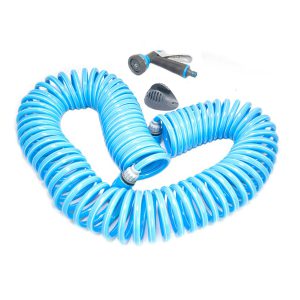Twisted hose One of the problems of heavy irrigation for gardeners and farmers is collecting the hose, and the screw hose has solved this problem.
Traditional hoses are bulky, heavy and easily rotted and damaged. Even the most avid gardener doesn’t want to lug around heavy hoses and deal with accidental kinks and knots in the sun. At least, not anyone who values their time, however, you don’t have to worry about any of these screw hose issues again. Unlike other hoses, the coiled hose has many features that can solve the problems of kinking and wear. Undoubtedly, it is a good option for those who want to spend less time twisting and untwisting their garden hose. That being said, we’ve compiled a list of the best coil-over hoses of 2023, so you can choose the best hose for your gardening needs. Let’s take a look at this year’s top 5 picks!
High quality coil hose:
Choosing a garden hose may be easy, but choosing the right one takes some homework. Various factors such as water pressure, diameter and length of hose, material and type of connector must be considered. And unless you’re an expert, you won’t know which one is best for your garden. Don’t worry, this guide will help you choose the ideal hose for your garden.
Why is it important to have a coiled hose?
There are definitely times when we don’t have time to water the plants, for such cases, we have the screw hose! There are many reasons to invest in a hose reel. Below are some of them.
These hoses are very resistant to wear, chemicals and UV damage.
They are very flexible and extremely efficient for watering small and hard-to-reach plants.
Unlike traditional hoses, this hose does not get tangled or twisted easily
You can easily connect it to your faucet without worrying about leaking or bursting.
Thanks to their ability to conserve water, they can save money on your monthly water bill.
While coiled hoses have several advantages, there is only one drawback. You cannot use them to spray chemicals on plants because the chemicals can damage the hose coil.
Basic features to look for when buying a coiled hose
Finding the right hose for your garden can be challenging. There are many options and it can be difficult to distinguish one product from another. To help you out, here are some factors to consider.
Screwed hose material
Coiled hoses consist of a coiled length of flexible vinyl tubing with an inner plastic liner. The vinyl tubing provides strength that allows the hose to withstand pressure and resist kinking, while the liner protects internal components from wear.
Also, make sure you choose hoses made of lightweight materials as heavy hoses are much harder to transport.
Type of connectors
Some screw-on hoses have plastic or metal fittings to connect to your existing garden hose. Make sure the hose is compatible with your system for easy installation and proper operation.
Resistance to twisting
When it comes to hose, you probably want to buy one that doesn’t kink easily. Twisting occurs when the hose twists itself into a tight coil, causing it to lose its shape. This makes it difficult to water plants or crops such as squash, cucumbers or tomatoes without damaging them or the soil. You should look for hoses that are resistant to twisting and kinking.
Hose diameter
Coil hoses come in a wide range of diameters, ranging from 3.8 inches (approximately 1 cm) to 1-1/2 inches (approximately 3 cm). The larger the diameter, the larger the hose. But these hoses are more expensive. Make sure to get a large diameter coiled hose that will make the water flow easier.
Length of threaded hose
Another important factor that affects your choice of garden hose is length. Hoses are manufactured in different lengths, the most common being 50 feet, 75 feet, 100 feet, and 150 feet. Shorter hoses are useful for gardens under 50 feet, while longer hoses are useful for gardens over 100 feet. Hoses longer than 100 feet are easily bent and can break if subjected to excessive pressure. Check the size of the garden and buy the hose accordingly.
water pressure Twisted hose
The pressure rating indicates how much pressure a Twisted hose can withstand before leaking. The higher the pressure, the more likely it is to burst underwater. Maximum pressure is usually between 40 and 60 PSI (allowing you to water plants at a rate of about 1/4 to 1/2 gallons per minute).
Water pressure in your municipality can vary greatly, so it is wise to have an accurate idea of your pressure before purchasing a coiled hose. Make sure your coiled hose can handle the pressure without bursting.
Flexible hose coil price range
Coil hoses are a valuable investment for any gardener. They come in a variety of materials and sizes and typically cost around $15 to $60. The least expensive coil hoses are made of rubber and have metal fittings. They are suitable for most outdoor tasks and can be purchased for less than $20.
Tips for coil hose maintenance
A coiled hose is one of the gardening accessories. Here are some tips for maintaining your hose.
After each use, rinse the coil hose with clean water, but do not use soap or detergent on the hose itself.
Coil hoses are flexible, but should not be overstretched, as overstretching the hose can damage or kink it.
Do not tie the hose together with thread or wire.
Check the hose regularly for signs of wear or punctures, and if you notice rust or leaks, replace it immediately.
Coiled hoses are vulnerable to rodent gnawing attacks, so store them inside your garage or shed whenever not in use.
If you buy a new screw-on hose, let it dry completely before trying to attach it to the pipe. Coil hoses do not have a built-in waterproofing system, so you need to apply some pressure to the faucet before turning on the water. If you do not do this, the water coming out of the hose may become contaminated or may freeze and cause the hose to crack.












بدون دیدگاه